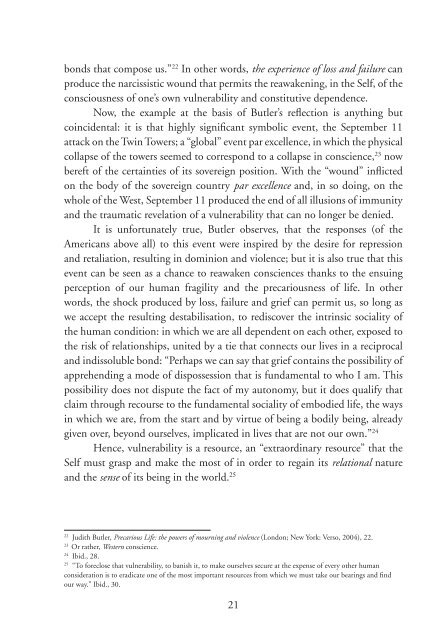Teaching Subjectivity. Travelling Selves for Feminist ... - MailChimp
Teaching Subjectivity. Travelling Selves for Feminist ... - MailChimp
Teaching Subjectivity. Travelling Selves for Feminist ... - MailChimp
Create successful ePaper yourself
Turn your PDF publications into a flip-book with our unique Google optimized e-Paper software.
onds that compose us.” 22 In other words, the experience of loss and failure can<br />
produce the narcissistic wound that permits the reawakening, in the Self, of the<br />
consciousness of one’s own vulnerability and constitutive dependence.<br />
Now, the example at the basis of Butler’s reflection is anything but<br />
coincidental: it is that highly significant symbolic event, the September 11<br />
attack on the Twin Towers; a “global” event par excellence, in which the physical<br />
collapse of the towers seemed to correspond to a collapse in conscience, 23 now<br />
bereft of the certainties of its sovereign position. With the “wound” inflicted<br />
on the body of the sovereign country par excellence and, in so doing, on the<br />
whole of the West, September 11 produced the end of all illusions of immunity<br />
and the traumatic revelation of a vulnerability that can no longer be denied.<br />
It is un<strong>for</strong>tunately true, Butler observes, that the responses (of the<br />
Americans above all) to this event were inspired by the desire <strong>for</strong> repression<br />
and retaliation, resulting in dominion and violence; but it is also true that this<br />
event can be seen as a chance to reawaken consciences thanks to the ensuing<br />
perception of our human fragility and the precariousness of life. In other<br />
words, the shock produced by loss, failure and grief can permit us, so long as<br />
we accept the resulting destabilisation, to rediscover the intrinsic sociality of<br />
the human condition: in which we are all dependent on each other, exposed to<br />
the risk of relationships, united by a tie that connects our lives in a reciprocal<br />
and indissoluble bond: “Perhaps we can say that grief contains the possibility of<br />
apprehending a mode of dispossession that is fundamental to who I am. This<br />
possibility does not dispute the fact of my autonomy, but it does qualify that<br />
claim through recourse to the fundamental sociality of embodied life, the ways<br />
in which we are, from the start and by virtue of being a bodily being, already<br />
given over, beyond ourselves, implicated in lives that are not our own.” 24<br />
Hence, vulnerability is a resource, an “extraordinary resource” that the<br />
Self must grasp and make the most of in order to regain its relational nature<br />
and the sense of its being in the world. 25<br />
22<br />
Judith Butler, Precarious Life: the powers of mourning and violence (London; New York: Verso, 2004), 22.<br />
23<br />
Or rather, Western conscience.<br />
24<br />
Ibid., 28.<br />
25<br />
“To <strong>for</strong>eclose that vulnerability, to banish it, to make ourselves secure at the expense of every other human<br />
consideration is to eradicate one of the most important resources from which we must take our bearings and find<br />
our way.” Ibid., 30.<br />
21

















